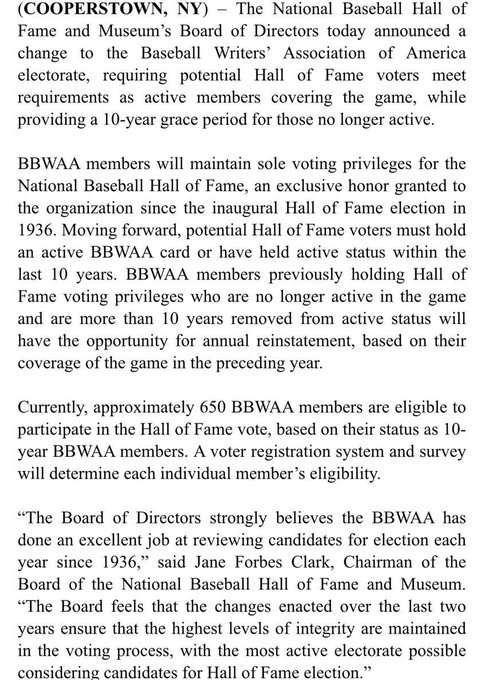The National Baseball Hall of Fame announced a major change Tuesday to the process by which players are voted into Cooperstown. The Hall of Fame is making the Baseball Writers Association of America, the longtime arbiters of voting, to take away ballots from members who haven't actively covered baseball in 10 years.
While it might seem perfectly rational to take Hall of Fame votes away from writers who no longer cover the game, that's never been the BBWAA way. Once a writer earns a Hall of Fame vote — it first takes 10 years of being a BBWAA member — he or she would keep the Hall of Fame vote for life.
And thus, you'd have voters who were quite detached from the game deciding who is worthy of baseball's most esteemed honor. There are about 650 eligible Hall of Fame voters with 549 ballots cast in the last election. A recent example of Hall of Fame voting gone awry: A voter chose Hideo Nomo two years ago but not Greg Maddux, Tom Glavine or Frank Thomas. He was a former newspaper reporter who had moved on to being the director of development and alumni affairs at a prep school. He said he was taking a moral stand against anybody who played in the PED era, but was sure Nomo had never cheated. Hey, once a Hall of Fame voter, always a Hall of Fame voter. Until now.
Here's the official announcement from the Hall of Fame on the matter:
The new policy raises some questions: How well will they be able track inactivity, for instance. Does writing three or four pieces a year count? What about longtime scribes who retired but still pay close attention? Perhaps they'll get some leeway with the "annual reinstatement" mentioned above.
Overall, though, this seems like a big step in the right direction for the Hall of Fame. If the Hall demands only the best players, then the electorate should be also be vetted closely. We're in the middle of the most complicated era of Hall of Fame voting, with so many differing opinions on PEDs and the era of baseball they consumed. Things will only get more complex when the Alex Rodriguezes of the world are eligible for Cooperstown.
Reigning in the pool of voters should change the conversation some. The voters who make the cut will be more contemporary and active within the game, not holding onto the way things used to be decades ago. Honoring history is great, being stuck in it, not so much. This probably still won't mean Barry Bonds and Roger Clemens get a big enough boost to reach the all-important 75 percent threshold, but their votes should increase somewhat.
And while a few ex-reporters in their new careers will be upset to lose their I'm-a-Hall-of-Fame-voter bragging rights, that's not nearly as important as refining what many fans looked at as a broken process.

No comments:
Post a Comment